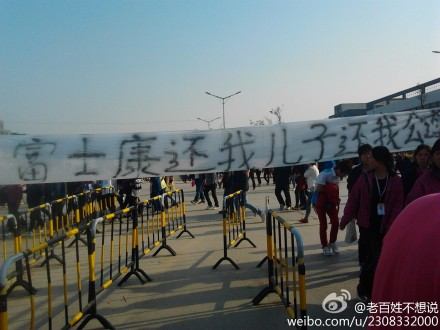Foxconn relaxes harsh labor rules after suicide specter resurfaces

Foxconn is reportedly relaxing its strict rules on factory workers' conduct during working hours, particularly abolishing the need to keep chatter among colleagues at a minimum while working. This loosening of its stance comes after two employees committed suicides in its Zhengzhou factory late last month.

According to a NetEase report Wednesday, Foxconn, which is a manufacturer of Apple's iPhone devices, is relaxing strict rules within its factories and abandoning its "mute mode" policy which bans workers from having any conversation that is not relevant to their jobs while in the workshop.
This directive appears to have been sent via e-mail from the top-level management of Foxconn's Integrated Digital Product Business Group (iDPBG) to factory administrators. It required all "mute mode" signs removed in the Zhengzhou factory while administrators are to be less restrictive regarding workers' movements from their assembly line positions during working hours, it added.
One Foxconn employee noted the new directive was not sent to floor workers, though. "The management did not announce the changes publicly, in fears that workers would become overjoyed and mistakenly think the company would ease up on all regulations in the future," the unnamed source said.
Another unnamed worker said: "The atmosphere has changed. The basic-level administrators used to shout at us but, all of a sudden, they start to use language like 'please keep quiet in the workshop'. This politeness was rarely seen previously."
The change in Foxconn's attitude can be attributed to the two suicides committed on its Zhengzhou factory, the report noted. On April 24, a 24-year-old male worker who just joined the company jumped off the dormitory building and died, while a 23-year-old female who had been at the same factory for six months followed suit three days later, it stated.
[UPDATE May 3, 3.30 p.m.] Foxconn issued a statement Friday to ZDNet Asia clarifying the two deaths. It confirmed the 23-year-old female employee's death at its Zhengzhou off-campus residence complex on April 27. The company also expressed its condolences to the employee's family and are "providing assistance" to them, while cooperating fully with law enforcement authorities as they carry out an investigation into the death.
However, Foxconn pointed out the death of the 24-year-old male on April 24 was in fact not a Foxconn employee at the time of his death.
"We were informed by law enforcement authorities that this individual was found dead on that date at a private residential facility in Zhengzhou. This individual had applied to work at our Zhengzhou campus but was not yet an employee and had never worked at any Foxconn facility," the company stated.
It added it is supporting law enforcement authorities as they investigate his death.
The company also addressed the "mute mode" policy mentioned in the NetEase report. It said it is mandate by its "own strict policies, Chinese government law, and our commitment to our customers" to ensure the highest level of health and safety standards are applied to all its operations, including in Zhengzhou.
It stated: "Workers are allowed to converse while working. However, as with most operators within our industry, and because our production lines are complex in operation and scale...we encourage employees to minimize discussions that are non-work-related and to ensure they do not disturb their fellow workers especially when operating machinery for safety reasons."
Foxconn said this is consistent practise with all its manufacturing operations in China and internationally, and it is consistent with its peers in the manufacturing industry.